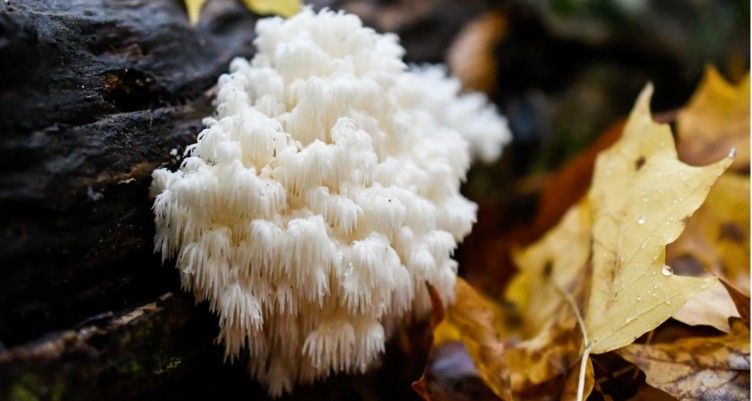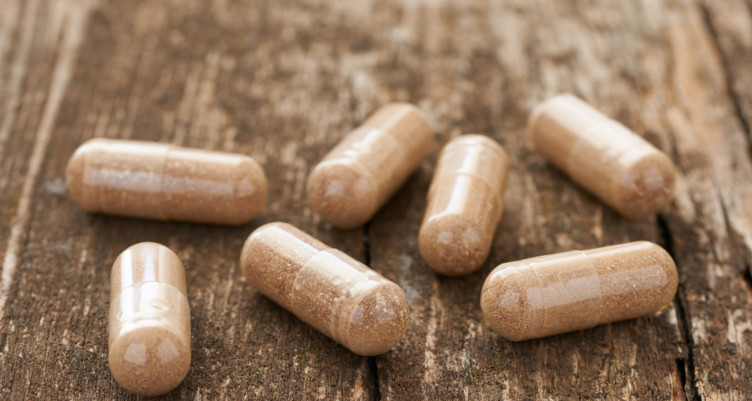- Studies show that lion’s mane mushroom may support brain health, improve mood and boost focus. The benefits stem from its anti-inflammatory and antioxidant properties.
- Animal studies show that lion’s mane mushroom may increase BDNF levels, a protein that supports brain health.
- For a potent way to increase BDNF levels, try Bulletproof NeuroMaster, which contains whole coffee fruit extract to keep you focused and sharp.
If you squint, lion’s mane mushroom looks a lot like its namesake—but it also looks like a funky cotton ball, a mophead or a tiny Komondor dog. Nature, right? It’s weird. Lion’s mane mushroom is also a powerful nootropic (aka smart drug) that has tons of science-backed benefits.
You might have heard of people mixing lion’s mane into their coffee or supplementing with lion’s mane mushroom capsules. What gives? Is it really good for you, or is everyone tripping on Mufasa?
As it turns out, if you want to remember better, age slower and supercharge your brain cells, lion’s mane may be worth your time. Here’s what you should know, including a few tips to take those neuroprotective benefits to the next level.
Lion’s mane mushroom benefits
With roots in traditional Chinese medicine (TCM), lion’s mane mushroom is also known as Hericium erinaceus, yamabushitake, hedgehog mushroom and houtou. Based on human and animal studies, this humble shroom has powerful anti-inflammatory, antioxidant and immunostimulant properties. Translation: It’s pretty amazing.
Supports brain health

Your brain naturally slows down over time. The symptoms you associate with aging—like memory loss and lack of focus—are caused by factors in your nervous system like shrinking neurons and damaged brain cells. Animal studies show that lion’s mane mushroom extract may actually support brain health by stimulating the creation of two important compounds: nerve growth factor (NGF) and brain-derived neurotrophic factor (BDNF).[1][2]
NGF and BDNF are proteins that stimulate the production of new cells and strengthen existing ones. NGF also plays an important role in forming myelin, the sheath around nerve cells that helps brain cells do their job. BDNF increases brain plasticity, which helps your brain cells stay resilient in the face of stress or aging.
May improve cognitive function

In 2008, a double-blind, parallel-group, placebo-controlled trial found that lion’s mane effectively improved cognitive function in a randomized group of 15 older adults.[3] Rodent studies found that lion’s mane potentially may have protective effects on brain cells, improve memory and promote the creation of new neurons.[4][5][6]
In an interview with Bulletproof founder Dave Asprey on an episode of the Bulletproof Radio podcast episode, tonic herbalists and superfood specialists Joy Coelho and Jay Denman say lion’s mane “helps to get rid of amyloid plaque as well as build myelin sheaths.” Amyloid plaque is a protein that destroys healthy neurons, impairs cognition and has been associated with neurodegenerative conditions.[7]
How does it work? Researchers are figuring that out right now, so they can’t say anything definitive—yet.
In a 2009 review, researchers found that hericenones and erinacines from the fruiting body and mycelium of lion’s mane easily cross the blood-brain barrier to stimulates NGF.[8]
Lion’s mane has also powerful antioxidant activity and anti-inflammatory properties.[9] Antioxidants neutralize free radicals, preventing them from causing inflammation or damaging your cells. Antioxidants help you make more BDNF, and lion’s mane stimulates BDNF and NGF.
That’s a one-two punch of neural health, which may slow or reverse cell degradation—a big deal for your brain right now, and an even bigger deal for future you.
Related: 13 Anti-Aging Supplements to Turn You Into Benjamin Button
May improve mood and focus

In 2010, researchers examined the effects of lion’s mane mushroom on 30 women over a four-week period.[10] The participants were randomly assigned to a test group or a control group, and they were given lion’s mane mushroom cookies or placebo cookies (science!). At the end of the four weeks, the lion’s mane mushroom group reported an improvement in mood.
This was a small study, and clinical research on lion’s mane is limited. However, these findings complement a growing body of research that suggests natural treatments can help you feel more balanced.
Lion’s mane may boost focus, too. Reduced inflammation improves blood flow, which provides your brain with more oxygen. The side effect of more oxygen in your brain is better brain performance. The antioxidants in lion’s mane may help promote learning and memory, possibly by strengthening your brain cells and stimulating the growth of new neurons.[11][12]
How to take lion’s mane mushroom

At this point, it’s no surprise to see why lion’s mane mushrooms have been a part of traditional Chinese medicine for millennia. So, what’s the best way to add it to your diet?
How to cook lion’s mane mushroom
You can prepare and cook lion’s mane mushroom like any other meaty mushroom. It tends to be in season in the late summer through fall. When cooked, it has a flavor and texture similar to crab or lobster. But unless you live near a farmers market or specialty store that sells these unique ‘shrooms, you might be better off taking lion’s mane in capsule form.
As with any supplement, you get the most benefits when you take lion’s mane mushroom consistently, and dietary supplements are generally more convenient. Keep reading for our top recommendations.
Lion’s mane mushroom capsules (and other supplements)
Lion’s mane supplements are available as capsules, extracts and powders. However, you need to do your research and make sure your supplementation comes from a reputable company. On the Bulletproof Radio podcast, author and medicinal mushroom pioneer Jeff Chilton says, “There are companies out there that will sell you these parts acting like, oh yeah, take two capsules a day of this and you’re good to go. You’re not good to go.”
You should be able to determine how much of the medicinal bioactive compound you’re getting in your supplement and how much is actually filler. Chilton’s company Real Mushrooms produces lion’s mane capsules that contain 1000mg of lion’s mane extract per serving and less than 5% of starch from vegetable-based filler ingredients.
Start with half a serving and slowly increase your dosage based on how your body responds. Talk to your health care provider for medical advice before you switch up your supplement routine.
Other ways to bolster brain health

Clinical trials on the benefits of lion’s mane are limited. But remember: One of the key benefits of lion’s mane mushroom is that it may stimulate NGF and BDNF levels. For a potent way to boost BDNF levels, switch to Bulletproof NeuroMaster. It’s made with coffee fruit extract, which contains compounds shown to support memory, focus and healthy aging. To start your smart routine, just take one capsule in the morning.
Did you know? Certain types of mushrooms are traditionally used to support immune health, including shiitake. Take advantage of ingredients to bolster your immune system defenses with Bulletproof Immune Defense Collagen Protein. Each packet contains a blend of shiitake mushrooms, 500 mg of vitamin C and 7 g’s of collagen protein. Reap the benefits by mixing one packet into 8oz of water daily.
It’s also okay to experiment and see what works best for you. If nothing else, lion’s mane and other mushrooms are a prime example of nature doing what it does best: packing incredible benefits into unexpected places, like funky pom pom fungi.
Read this next: Does Your Gut Control Your Immune System? The Science Behind the Connection
Join the Bulletproof Revolution
Sign up for early access to sales, product launches, the latest Bulletproof news and more!
This article has been updated with new content.


Very interesting subject, appreciate it for posting.Money from blog